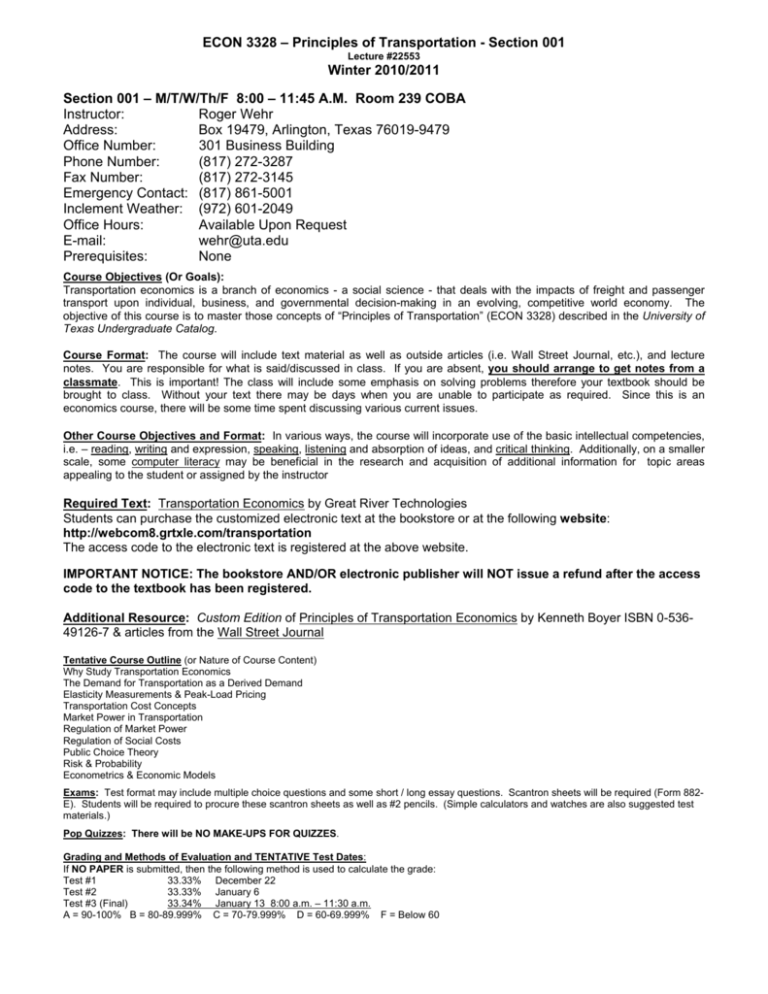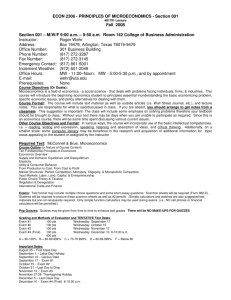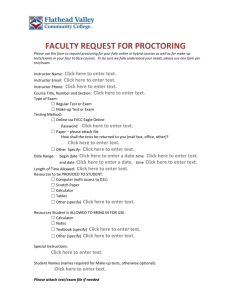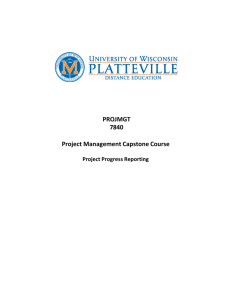ECON 3328 - The University of Texas at Arlington
advertisement

ECON 3328 – Principles of Transportation - Section 001 Lecture #22553 Winter 2010/2011 Section 001 – M/T/W/Th/F 8:00 – 11:45 A.M. Room 239 COBA Instructor: Roger Wehr Address: Box 19479, Arlington, Texas 76019-9479 Office Number: 301 Business Building Phone Number: (817) 272-3287 Fax Number: (817) 272-3145 Emergency Contact: (817) 861-5001 Inclement Weather: (972) 601-2049 Office Hours: Available Upon Request E-mail: wehr@uta.edu Prerequisites: None Course Objectives (Or Goals): Transportation economics is a branch of economics - a social science - that deals with the impacts of freight and passenger transport upon individual, business, and governmental decision-making in an evolving, competitive world economy. The objective of this course is to master those concepts of “Principles of Transportation” (ECON 3328) described in the University of Texas Undergraduate Catalog. Course Format: The course will include text material as well as outside articles (i.e. Wall Street Journal, etc.), and lecture notes. You are responsible for what is said/discussed in class. If you are absent, you should arrange to get notes from a classmate. This is important! The class will include some emphasis on solving problems therefore your textbook should be brought to class. Without your text there may be days when you are unable to participate as required. Since this is an economics course, there will be some time spent discussing various current issues. Other Course Objectives and Format: In various ways, the course will incorporate use of the basic intellectual competencies, i.e. – reading, writing and expression, speaking, listening and absorption of ideas, and critical thinking. Additionally, on a smaller scale, some computer literacy may be beneficial in the research and acquisition of additional information for topic areas appealing to the student or assigned by the instructor Required Text: Transportation Economics by Great River Technologies Students can purchase the customized electronic text at the bookstore or at the following website: http://webcom8.grtxle.com/transportation The access code to the electronic text is registered at the above website. IMPORTANT NOTICE: The bookstore AND/OR electronic publisher will NOT issue a refund after the access code to the textbook has been registered. Additional Resource: Custom Edition of Principles of Transportation Economics by Kenneth Boyer ISBN 0-53649126-7 & articles from the Wall Street Journal Tentative Course Outline (or Nature of Course Content) Why Study Transportation Economics The Demand for Transportation as a Derived Demand Elasticity Measurements & Peak-Load Pricing Transportation Cost Concepts Market Power in Transportation Regulation of Market Power Regulation of Social Costs Public Choice Theory Risk & Probability Econometrics & Economic Models Exams: Test format may include multiple choice questions and some short / long essay questions. Scantron sheets will be required (Form 882E). Students will be required to procure these scantron sheets as well as #2 pencils. (Simple calculators and watches are also suggested test materials.) Pop Quizzes: There will be NO MAKE-UPS FOR QUIZZES. Grading and Methods of Evaluation and TENTATIVE Test Dates: If NO PAPER is submitted, then the following method is used to calculate the grade: Test #1 33.33% December 22 Test #2 33.33% January 6 Test #3 (Final) 33.34% January 13 8:00 a.m. – 11:30 a.m. A = 90-100% B = 80-89.999% C = 70-79.999% D = 60-69.999% F = Below 60 If a PAPER is submitted, then the following method is used to calculate the grade: Test #1 30% December 22 Test #2 30% January 6 Optional Paper 10% January 11 Test #3 (Final) 30% January 13 8:00 a.m. – 11:30 a.m. A = 90-100% B = 80-89.999% C = 70-79.999% D = 60-69.999% F = Below 60 Important Dates: December 20 - First Day of Class December 22 – Test #1 January 3 - Classes Continue January 5 – Scheduled Class January 7 – Scheduled Class January 12 – Scheduled Class December 21 - Census Date December 23 – January 2 NO CLASSES SCHEDULED January 4 – Scheduled Class January 6 – Test #2 & LAST DAY TO DROP January 11 – Scheduled Class& Optional Paper Due by 5 p.m. in hardcopy format at 301 COBA January 13 - Test #3 (a.k.a. Final Exam) 8:00 a.m. – 11:30 a.m. Extra Credit: Generally there is no formal extra credit. On occasion, I might give a pure extra credit quiz. The optional long paper is the best way to earn additional points for the final grade. Disclaimer Regarding Syllabus: I reserve the right to make changes to the syllabus as the semester progresses. Students are responsible for being aware of these changes. Make-up Exam Policy: All students are expected to take the tests at the assigned time (not early or late). If for some reason you must miss a test, you should notify me beforehand. Make-up tests are for extenuating circumstances only. If a make-up is approved by the instructor, it will be given AT THE END OF THE SEMESTER DURING THE WEEK BEFORE FINAL EXAMS. Attendance Policy: Roll may be taken at each class. Students are expected to attend class. A seating chart may be used. If you regularly miss class, then my assumption is that the class is not very important to you. Laptop Computer: Any laptops brought to class are to be used strictly for this class. I reserve the right to ask that laptops be turned off if there is any abuse in this area, i.e., surfing the web during class, shopping, e-mailing, internet dating, et cetera. E-Mail: E-Mail is to be used for academic purposes. Do not use e-mail to forward jokes or political views. Any harassing or profane e-mail will be reported to campus authorities and is subject to disciplinary action. Grade Grievances: You have one calendar year from the date the grade is assigned to initiate any grievance. The normal academic channels are department chair, academic dean, and the Provost. Drop Policy: The instructor is not responsible for dropping you from class if you quit attending! It is the student’s responsibility to complete the course or withdraw from the course in accordance with University Regulations. Students are strongly encouraged to verify their grade status before dropping a course after the first withdrawal date. A student who drops a course after the first withdrawal date may receive an “F” in the course if the student is failing at the time the course is dropped. College Policy: Students who have not paid by the census date and are dropped for non-payment cannot receive a grade for the course in any circumstances. Therefore, a student dropped for non-payment who continues to attend the course will not receive a grade for the course. Emergency loans are available to help students pay tuition and fees. Students can apply for emergency loans by going to the Emergency Tuition Loan Distribution Center at E.H. Hereford University Center (near the southwest entrance). Academic Integrity: It is the philosophy of The University of Texas at Arlington that academic dishonesty is a completely unacceptable mode of conduct and will not be tolerated in any form. All persons involved in academic dishonesty will be disciplined in accordance with University regulations and procedures. Discipline may include suspension or expulsion from the University. “Scholastic dishonesty includes but is not limited to cheating, plagiarism, collusion, the submission for credit of any work or materials that are attributable in whole or in part to another person, taking an examination for another person, any act designed to give unfair advantage to a student or the attempt to commit such acts.” (Regents Rules and Regulations, Part One, Chapter VI, Section 3, Subsection 3.2, Subdivision 3.22) Americans with Disabilities Act: If a student requires an accommodation based on disability, the student should meet with the instructor in his/her office during the first week of the semester. As a faculty member, I am required by law to provide “reasonable accommodation” to students with disabilities, so as not to discriminate on the basis of that disability. Student responsibility primarily rests with informing faculty at the beginning of the semester and in providing authorized documentation through designated administrative channels. Food and Drink in Classrooms: College policy prohibits food and/or drinks in classrooms and labs. Anyone bringing food and/or drinks into a classroom or lab will be required to remove such items, as directed by the class instructor or lab supervisor. Student Support Services: The University of Texas at Arlington supports a variety of student success programs to help you connect with the University and achieve academic success. They include learning assistance, developmental education, advising and mentoring, admission and transition, and federally funded programs. Students requiring assistance academically, personally, or socially should contact the Office of Student Success Programs at 817-272-6107 for more information and appropriate referrals. Bomb Threats: If anyone is tempted to call in a bomb threat, be aware that UTA will attempt to trace the phone call and prosecute all responsible parties. Every effort will be made to avoid cancellation of presentations/tests caused by bomb threats. Unannounced alternate sites will be available for these classes. Your instructor will make you aware of alternate class sites in the event that your classroom is not available. Simple Calculators Only! – No text devices to be used during tests for any purpose, i.e. – pagers, cell phones, or any other electronic device with text capability. Evacuation Procedure: In the event of an evacuation of the College of Business Building, when the fire alarm sounds, everyone must leave the building by the stairs. With the fire alarm system we now have, the elevators will all go to the first floor and stay there until the system is turned off. EVACUATION FOR DISABLED PERSONS: Please go to the Northeast fire stairs. An evacu track chair is located on the 6th floor stairwell. Employees trained in the use of this chair will go to the 6th floor and bring the chair to any lower floor stairwell to assist disabled persons.







